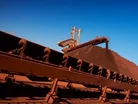BHP Billiton to Expand Iron Ore Operations in Pilbara

CEO Andrew Mackenzie realises that the price of iron ore is not going to get above $100 a tonne in the near future. Still, right after the announcement of the demerger of non-core assets, BHP Billiton is planning on spending an extra $3.5 billion to expand their iron ore mines and increase production in the Pilbara region.
Although this doesn’t seem like a safe move because of iron ore prices hovering at a 5-year low, it’s still worth it for BHP Billiton. The company has a low operating cost with iron ore – approximately $40 a tonne. There’s still plenty of profit in it for BHP Billiton, as prices would have to fall far lower before expansion would not be worth it.
“We would say it is quite unlikely that we would see prices north of $US100 a tonne, so our forecasts are obviously based on something below that,” Mackenzie told British media when asked if there might be a price floor around current price levels.
The demand continues to fall in part because Chinese steel mills have been downsizing their iron ore inventory as the price of steel also declines, in part because of uncertain demand and the continued expanded production from the major iron ore producers in Australia.
Still, BHP Billiton is looking to increase the annual capacity of its Pilbara iron ore mines and ports to 290 million tonnes a year, up from the previous target of 270 million tonnes a year. This expansion is on top of the plans to boost output to 225 million tonnes a year.
Iron ore prices fell to $90.10 on Friday. According to analysts for Macquarie and reported by Mining Global, a continued lack of buying for the precious metal was possible.
Information sourced from The Australian.
- Rio Tinto completes paperless iron ore trade with CargillLeadership & Strategy
- Rio Tinto hails successful deployment of automated rail networkTechnology
- Downer lands Rio Tinto rail renewal services supplier contractLeadership & Strategy
- ExxonMobil to expand gas supply to Australian marketLeadership & Strategy
Featured Articles
Nirvik Singh, Global COO and President International of Grey Group, cultivating culture and utilising AI to enhance rather than replace human creativity
On a mission to accelerate the adoption of sustainable energy solutions, US$30 billion Chinese tech firm Longi is not just selling solar – but using it
Armed with an ambitious billion-dollar strategy, Samsung is on track to achieve net zero carbon emissions company-wide by 2050 – but challenges persist

